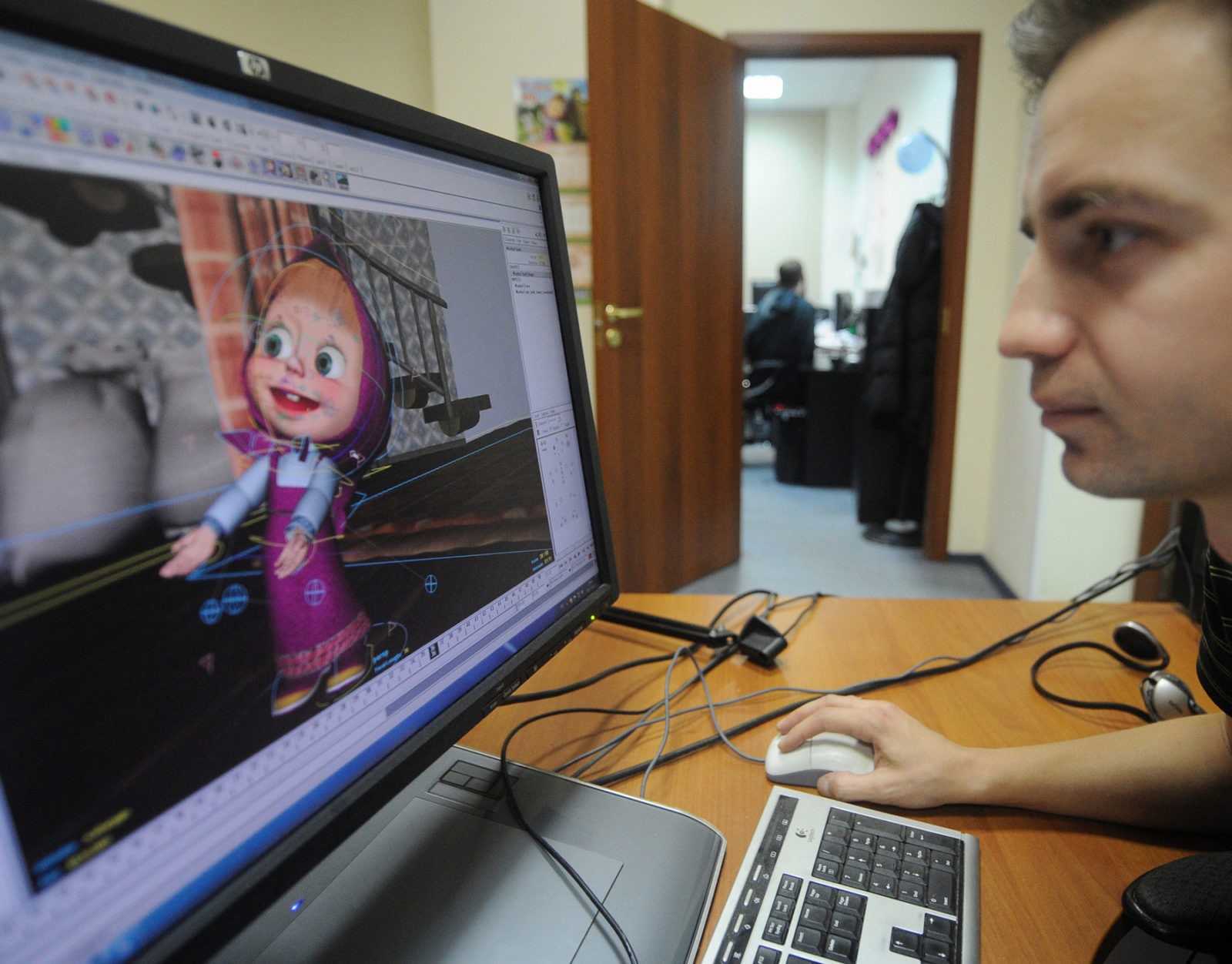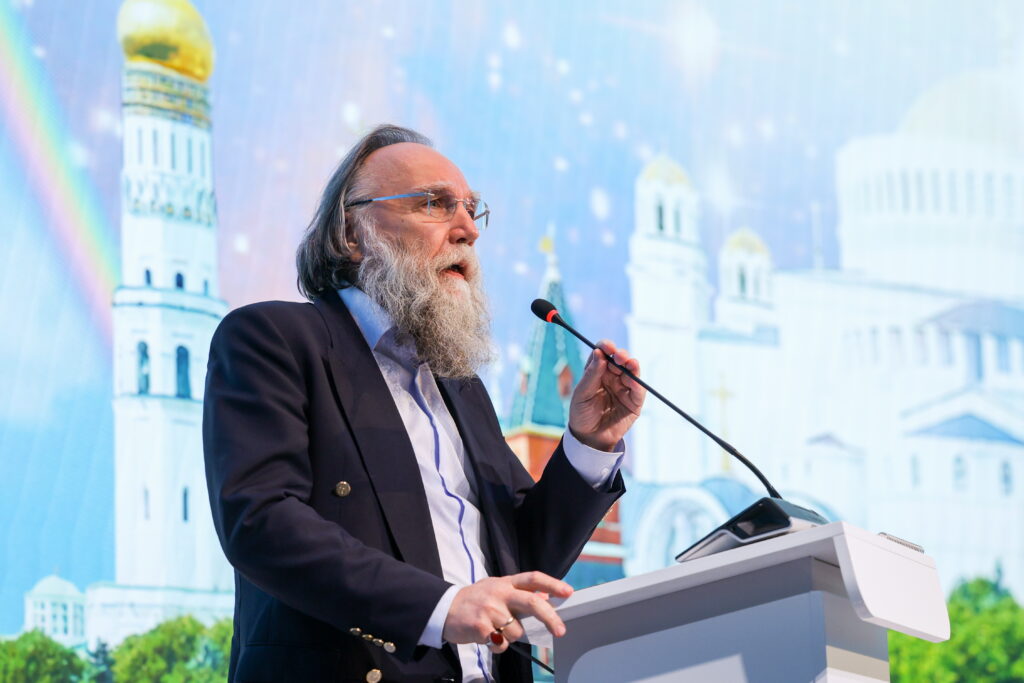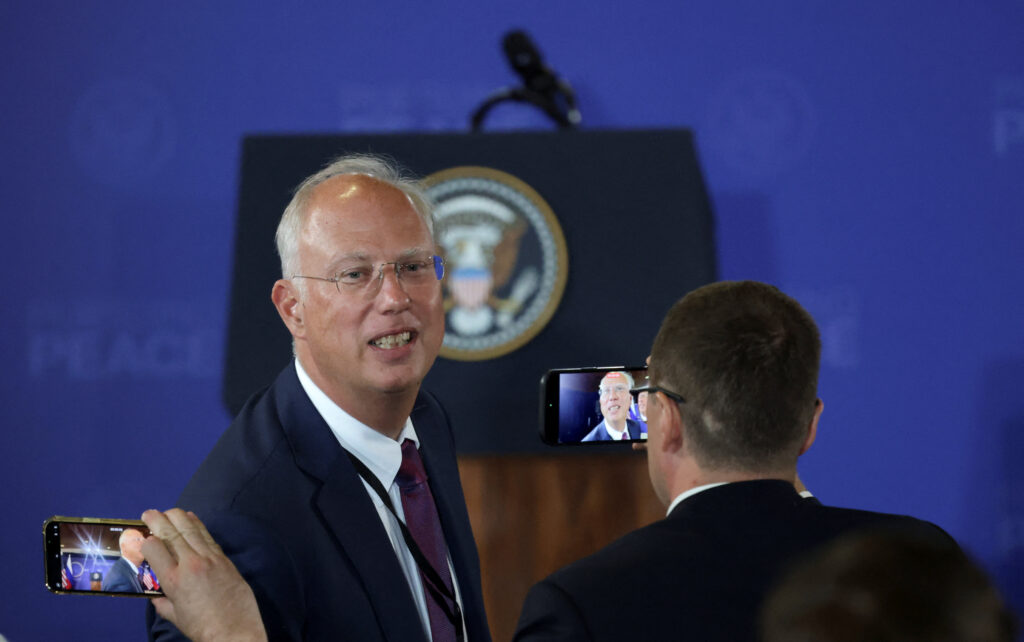In November 2018, The Times published a short article about the popular, award-winning animated TV series “Masha and the Bear.” The article suggested that the show – which features the freewheeling adventures of a little girl named Masha and was produced by a Russian company – is in fact “a ‘soft propaganda’ tool for the Kremlin.” The main reasons for this suggestion were that Masha was seen, by one British professor, as “feisty, even rather nasty, but also plucky”, and, eventually, “Putinesque”, while “the Bear symbolised Russia and was designed to replace a negative image of the country with a positive one in children’s minds”.
Later that month, 27 members of the European Parliament signed a letter addressed to Amazon’s CEO, Jeff Bezos, who they asked to discontinue the sales of goods with Soviet symbols. Shortly after, Ukraine’s acting Health Minister Ulyana Suprun complained via Facebook that Amazon was selling products featuring symbols of the pro-Russian separatist Donetsk People’s Republic (DPR). This complaint was followed by a letter written by Ukraine’s Ambassador to the US, who asked Bezos specifically to remove the goods “promoting” the DPR. (Curiously enough, Ukraine’s Ambassador to the US seems be fine with the goods carrying symbols of the Lugansk People’s Republic, as they were not mentioned in his letter to Amazon.)
Although different in form and content, the Masha-bashing article and complaints to Amazon (that most likely were inspired by similar appeals to Walmart and Adidas last year) are a relatively new development. Of course, Russian state-controlled media may flag this development as “anti-Russian hysteria”. But leaving Russia as a point of reference behind, we can instead see this as part of the rise of victimhood culture in the area of profane geopolitics.
Honour, Dignity and Victimhood
“Victimhood culture” is a term proposed by sociologists Bradley Campbell and Jason Manning in their 2018 book The Rise of Victimhood Culture: Microaggressions, Safe Spaces, and the New Culture Wars. The authors argue that today the culture of victimhood clashes with the culture of dignity that once, in turn, replaced the culture of honour. In honour cultures, “it is one’s reputation that makes one honorable or not, and one must respond aggressively to insults, aggressions, and challenges or else lose honor”. For culture of dignity, which is currently the dominant moral culture in the West, public reputation is less important than dignity, “a kind of inherent worth that cannot be alienated by others”. Although insults and slights may still be offensive, they no longer shape or alter an individual’s self-awareness as a person and are usually ignored as unworthy of notice. In cases of severe offense, however, people are advised to turn to law enforcement or court battles. In contrast, in victimhood culture, “individuals and groups display a high sensitivity to slight, have a tendency to handle conflicts through complaints to authorities and other third parties, and seek to cultivate an image of being victims who deserve assistance”.
For people promoting the culture of victimhood, neither honour nor dignity is as important as their own self-declared status of a victim of oppression and various “microaggressions” – a label that they attach to statements and behaviour of other people that they consider offensive on the basis of race, ethnicity, religion, gender, sexual identity, body shape, etc. Self-declared victims may demand the establishing of safe spaces, or mark with trigger warnings those events where they may be exposed to traumatic experiences. However, these demands seem to aim less at avoiding information that may trigger their real or imagined traumas than to reinforcing victimhood status. In this moral culture, taking offense and complaining are as essential as vindicating one’s honour in an honour culture or retaining one’s dignity in the culture of dignity.
The hotbed of victimhood culture is mostly the Left-dominated environment of American, Canadian and British university campuses. Yet more recently, ideas about microaggressions appear to have exerted a notable impact on Western societies beyond their ivory towers. To a certain degree, it has become normal to exaggerate, and overreact to, perceived insults and slights, parade one’s own – again, real or imagined – vulnerabilities, weaknesses and traumas, and publicly complain about what is felt as microaggressions.
As the rise of the victimhood culture and its mainstreaming are relatively recent, it is hardly a coincidence that there is a considerable time gap between, on the one hand, the above-mentioned article in The Times and complaints to Amazon, and, on the other, the emergence of the phenomena that presumably triggered their appearance.
The first episode of “Masha and the Bear” was aired in 2009, i.e. almost ten years ago. “Soviet goods” have been on Amazon perhaps since the times when it ceased to be simply an online bookstore and started growing as a global retail company. In their letter to Amazon, the MEPs refer to a ban imposed, in 2011, by the European Court of Justice on the Soviet hammer-and-sickle symbol being used as a commercial trademark. Ukraine’s complaint came late too: a brief search on Amazon suggests that the first “DPR goods” appeared as early as, at the very least, 2015 – a good four years ago. In other words, the alleged triggers have been out there for years. Only now have they commanded significant attention. So, why now?
The context is essential. The current crisis in the relations between Russia and the West has created favourable conditions for the rise of the victimhood culture in profane geopolitics. Moscow’s subversive behaviour on the international stage manifested through the interference in the elections in Western societies, massive disinformation campaigns, cyberattacks against Western institutions, etc. invoked a series of developments. First, many in the West have become (more) cautious about Russia. Second, some Western experts and opinion-makers started investing an immense amount of effort into raising awareness of the Russian threat.
In the framework of culture of dignity, neither “Masha and the Bear” nor “Soviet goods” on Amazon are seen as problematic, i.e. subversive or threatening. Even if we do not like them, we tend to shrug them off and dismiss them as irrelevant. Unlike cyberattacks or corruption of Western politics, they are not worthy of our attention.
Safe Spaces and “Masha Agressions”
And yet, victimhood culture now challenges the culture of dignity. Proponents of this new moral culture are not simply cautious about all things Russian; they are hypersensitive about them to the point where everything that is Russian is endowed with an inherently toxic quality.
Furthermore, they blow the Kremlin’s interference in Western politics out of proportion and turn it into the geopolitical oppression on the part of Russia. They may claim the status of victims of this oppression or they may emerge as representatives of those victims. One way or another, they are offended by anything even remotely related to Russia. Animated Masha is no longer just a little adventurous girl – she’s a microaggression, a “masha-aggression”, a harbinger of geopolitical oppression. In an evident jab at Putin’s Russia that glorifies its Soviet past, the 27 MEPs suddenly feel the need to take offense by claiming that “Soviet goods” on Amazon “demonstrate lack of compassion to millions of European citizens”.
Proponents of the victimhood culture often lack any profound expertise of the topic of their concern – they rarely speak Russian language, are largely unfamiliar with Russian culture (except for the “Masha and the Bear” TV series, obviously) and hardly ever travel to the country – but they are definitely “woke” to the Russian threat. With a convert’s zeal, they struggle for absolute purity and are intolerant to nuanced, better informed analyses of Russia-related phenomena. It seems only pervertedly natural that they tend to consider defenders of dignity culture as Moscow’s enablers, insensitive to the traumas of the self-declared victims of Russian geopolitical oppression.
The victimhood culture of profane geopolitics is far from harmless. Safe spaces free of “Russian triggers” contribute nothing to the information space resilience of Western nations. Meanwhile, the noise produced by complaints about “masha-aggressions” may weaken responses to more serious transgressions of the international rules and norms, putting them on the same level as insignificant “slights” and “insults” of profane geopolitics.
By endorsing the self-victimising and over-generalising interpretation of everything Russian as toxic, threatening and subversive, victimhood culture promotes a blatantly anti-Russian sentiment. This sentiment is wide open to well-deserved criticism on anti-racist grounds, while helping – or, perhaps, even inviting – Moscow to lump legitimate criticism of the Kremlin’s policies together with any old anti-Russian sentiment, which then both end up getting dismissed together as “xenophobic.”
Last but not least, the weaponisation of moral indignation via self-victimisation leads to the endless competition of victimhoods. There is no objective resolution here, as everybody is theoretically entitled to feel oppressed by anything they want.










